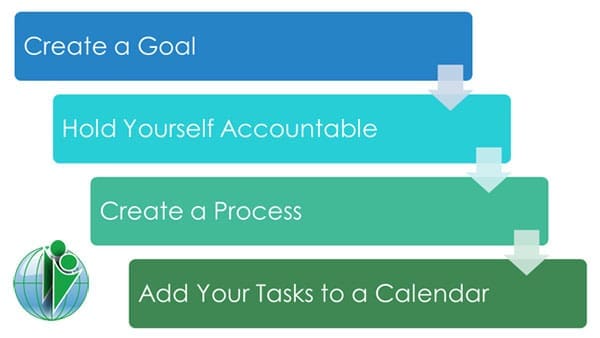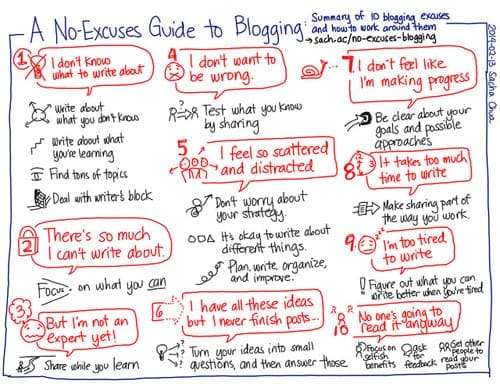Strong habits that will ramp up your blogging
This page may contain links to Amazon.com or other sites from which I may receive commission on purchases you make after clicking on such links. Read my full Disclosure Policy

Producing content and sharing it with your audience requires consistent effort on your part. In this post, I’ll share a few different writing habits you can cultivate and practice.
The more you write, the better and faster you’ll become. If you find writing arduous, rest assured that the more you do it, the easier it will get. Dedicate time to researching, writing, and editing without worrying about the outcome. Think of it as a skill you’re learning and honing.
Consistency is important for posting on a regular basis, but it’s also important for your writing skills. If you set aside a little time each day for writing, it won’t take long to see a great deal of improvement. It’s a bit like exercise to train your body. Daily writing trains your brain to write.
How to Create Strong Writing Habits

Step 1 – Create a goal
Commit yourself to writing a certain amount every day. For example, if you set a goal of writing 200 words per day, you can commit to publishing two 500-word posts per week.
Set a daily goal that’s realistic and achievable, but don’t be afraid to push yourself a little. Whatever your goal, make sure you’re consistent with it.
Step 2 – Hold yourself accountable
If you find it difficult to keep yourself accountable, enlist the help of a blogging partner. The two of you can discuss your goals, then check in at pre-arranged and regular intervals to see if you’re both sticking to your plan. A coach can also help with accountability.
Another option is to tell your social media followers what you’re doing. Announce that you’ve set a goal, and then report on your progress. You’ll then be accountable to everyone you know on social media!
There are also apps and software programs, such as coach.me, to help you create habits and track your progress.
Step 3 – Create a process
List the specific tasks you need to accomplish each week and estimate the time it will take to perform each.
Here is an example of a blogging task list:
- Brainstorm topics using customer data (20 minutes)
- Create titles for those topics (20 minutes)
- Create headings and subheadings (20 minutes)
- Write introductions (30 minutes)
- Write article bodies (3 hours)
- Create or find images (1 hour)
- Edit and re-edit (1 hour or 30 minutes per post)
- Create your social media plan to promote your posts (30 minutes)
It’s best to create an environment with as few distractions as possible, so you may want to turn off your phone, social media, and email notifications during your writing time.
Step 4 – Add your tasks to a calendar
Many people only use their calendars to keep track of meetings or appointments, but highly organized people use them for everything. Your calendar shows you visually what you need to do day by day and week by week. It also keeps you honest, by giving you a complete snapshot of how you spend your time.
In the sample task list above, there are about seven hours of work, which should be distributed over the week. Your schedule might be any of the following:
- one hour a day for seven days a week
- 5 hours per day from Monday to Friday
- two hours on Monday and Friday and one hour on Tuesday through Thursday
Choose whatever works best for your workstyle and your other commitments.
Step 5 – Decide when you will work
For many people, morning is the best time for writing. Even if you’re not a morning person, you may feel freshest in the morning, and this might be the optimal time to use your brain power.
Choose a time when there are the fewest distractions; for example, before the kids come home from school. Some people prefer to blog late at night or before sunrise.
You might choose to break up your tasks into different times of day. For example, you might find that you have better brainstorming sessions at night when all your other work is done, whereas the best time for the actual writing and editing is the morning.
Other Tips to Help You Maintain Your Blogging Schedule
Plan your diet well to optimize your productivity. For example, you may feel that you’re more productive if you eat a light breakfast of just fruit and yogurt. Find out what works best for you and plan accordingly.
Choose the right length of time after waking up to get started writing. You might feel that you’re best at working as soon as you wake up. On the other hand, you may feel that it’s best to have a cup of coffee, watch a little TV, and do some light exercise first.
When you work for any serious length of time, take short breaks to re-energize. When you take a break, physically get up from the computer. You may want to stretch or do some housework or other busy activity to clear your mind so you can refresh. You’ll find it much easier to focus when you sit back down to work again, and it’s better for your body as well.
In addition to developing good blogging strategies, it also helps to develop good reading habits. Get into the routine of reading blogs, websites, and news. Subscribe to your favorite blogs. Save time by using an app that lets you put all of the blogs and sites you read in one place, such as Flipboard or Feedly. Schedule time to read each day to keep in touch with what’s happening in your niche or industry.
You can also use tools like Evernote to keep track of your brainstorming. Whether you brainstorm on paper, an app, or your smartphone’s notes, keep your list somewhere consistent.
Let’s talk!
Do you have an established blogging routine? Tell us about it in the comments!
Photo © jannystockphoto / DepositPhotos




I do have a routine, but I don’t work on blogging every day. Weekdays are largely taken up with clients, so the most I do is comment and share.. and come up with new ideas! I mostly do writing on the weekends, which works for me. I agree that scheduling in time and setting boundaries for when you will – and will not- work is so important!!
It is definitely working for you – your blog posts are well-written and well-read, and you’re a great commenter and sharer too!
Like Seana, I have a writing routine, but it’s flexible. I do different types of writing so the writing isn’t just for my blog. Sometimes it’s writing for an article or in personal journals or even to going old school and writing notes to loved ones with a pen and paper. Ideas for the blog are constantly being collected. They come from many sources including conversations, books, magazines, pop-up thoughts, experiences, and observations. My blog calendar keeps me on track for the date of the posts and what general topic I’ll be focusing on (specific topic chosen for each month.) Then I carve out time once a week to write, edit and format my post. I don’t have it blocked in on my calendar, but I do have it as a weekly repeat, “write blog post,” on my to-do list. It’s a fluid process with some built-in flexibility. It works for me.
Sounds great, Linda! And what I said to Seana applies equally to you.
By the way, writing daily will help you to become an even better blogger, even if the writing isn’t for your blog.
Thanks so much, Janet. That means a lot, especially from you.
One thing I’ve discovered over the last several years is how much I enjoy the writing process…in all the various and assorted forms it comes in.
Me too! I actually feel sorry for people who don’t enjoy writing, or reading. They both bring me so much pleasure!
Great tips for blogging, Janet. I find that being creative is a lot easier when I feel healthy. Taking a walk or do yoga gives me time to rest my mind and allow the ideas to flow again. I also prefer writing down recurring tasks directly on my digital calendar, even the 15-30 minute tasks. When I don’t write them down, I tend to not think of them as necessary activities. Therefore, it never gets done.
It’s just like I said in your post The Best Advice You Were Told About Taking Care Of Yourself: “When you least feel like you can afford to take a break is when you most need one.”
I was reminded of this on the weekend. I had tons to do, but took a day trip with my sister. Even though the outing was a bit disappointing (we had trouble finding our destination, the coffee was undrinkable, etc.) it was energizing.
Love this post Janet! One of my goals for 2017 was to be more consistent with my blogging….I started off strong but over the past few weeks have faded a bit. Your post and tips are exactly what I needed as a redirect – thanks so much!
I’m so happy to hear that, Liana! I love it when I stumble on the advice I need right when I need it, and even more when I’m able to do that for someone else.
Great post, Janet. I like writing but do not always give it the attention it needs. I tend to just comment on other people’s blogs and put my own blog out randomly. I’m working on a schedule and will stick with it once I have one that works with my other responsibilities. I’m a bit like Sabrina in that I schedule my daily tasks as well as appointments. I like crossing off the tasks I’ve accomplished and seeing my list evaporate!
It can be challenging to figure out a schedule that works for you! I used to write my blog posts first thing in the morning, to be published that day, but found that was eating up too much time. Now I block time every week to work on the following week’s posts.
Great article. I achieved great success in Facebook since I read your social networks articles. Now I will try these tips. Thanks!
Such a timely article for me. I just changed my writing routine since I wasn’t blogging as often as I wanted to. Now, instead of setting large blocks of time for my blog a few times a month, I have switched to writing 15 minutes a day in the morning. As your post mentions, I am at my freshest in the morning, either during my first cup of coffee or immediately after. I am calmer and I don’t feel pressure or worry about what I am writing so it flows more. I have already finished my blog for them month and just need to upload images, do the SEO and I’m done! I also try to clean up my list of subscribers every month just before hitting “Publish” since the 2 habits are tied together.
That sounds like a great system, Jill! Blogging doesn’t have to be a burden. 🙂
Really great tips. They work for journaling too and I know that people struggle with keeping the momentum going. It can be helpful to have a deadline. I challenge myself to do 20 minutes then see how I feel and move on from there.
That makes sense! I bet they would work for just about any form of writing.